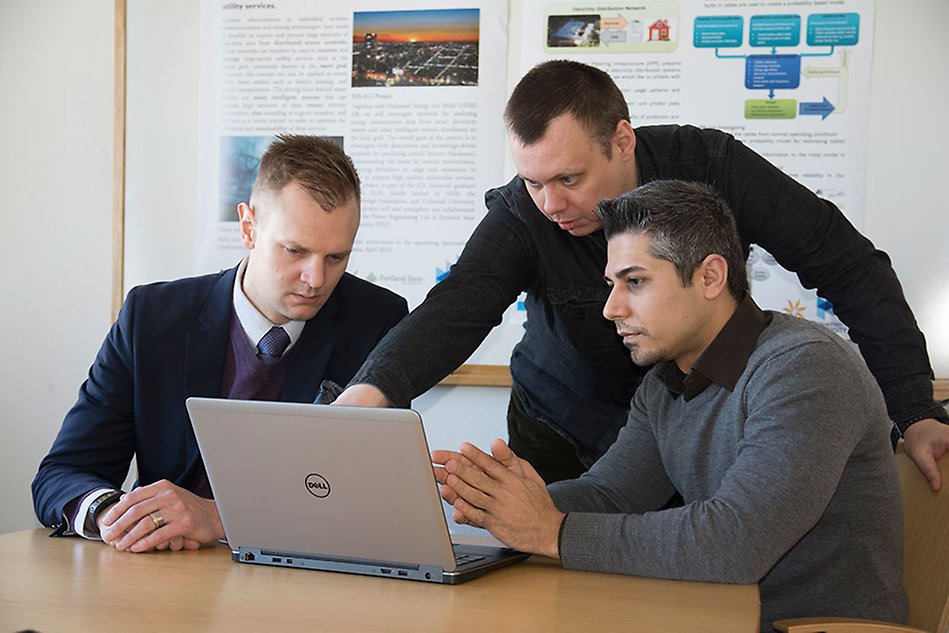Research for fewer power outages
The results of his research enable power distribution companies to change from reactive to predictive maintenance. This reduces the risks of long outages annoying the customers as well as costly and time consuming repair actions for the distribution companies. Hassan Nemati has developed methods that can extract information from available data in smart distribution grids.
”Hassan Nemati’s research has augmented the company’s perspective of the complex nature of its task. The research is also useful in developing the skill to sort data, both to see what kind of data the company needs more of – and what kind of data that is irrelevant.”
Alexander Örning, Halmstad Energi och Miljö

”The purpose of extracting information as early as possible from already available data is to detect weak spots in electricity distribution grids, e.g. areas with power quality problems. The results of my research enable power distribution companies to, at a larger scale, apply predictive maintenance of their distribution grids instead of costly and time consuming repairs”, says Hassan Nemati.
A reduced number of long outages is beneficial both to power distribution companies and their customers. Less vulnerable distribution grids are becoming increasingly important also at community level.
Large benefit to power companies
The aim of Hassan Nemati’s research project was to reduce the number and duration of electricity outages at the electricity grid at Halmstad Energi och Miljö AB (HEM), which is the electricity distribution company operating in and around Halmstad city.
”The method I proposed for failure pattern discovery got attention from other electricity distribution companies in Sweden such as Öresundskraft, Göteborg Energy, and Växjö Energy. These companies asked if I could analyse their data as well and, after receiving the outcomes, the companies claim that the results were very beneficial.”

Hassan Nemati (to the right) together with two of his supervisors: Alexander Örning from HEM and Slawomir Nowaczyk from Halmstad University.
Alexander Örning, Electrical Engineering alumnus from Halmstad University, has been one of Hassan Nemati’s supervisors at HEM. He says Hassan Nemati’s research has augmented the company’s perspective of the complex nature of its task. The research is also useful in developing the skill to sort data, both to see what kind of data the company needs more of – and what kind of data that is irrelevant.
”This will help us making better demands in the future. We also have a better insight as of how to develop our IT environment for the years to come. IT environment is crucial in getting access to relevant measurements”, says Alexander Örning.
Research developed in sharp projects
Hassan Nemati started his postgraduate research studies in 2014. He has been a doctoral student at the Embedded and Intelligent Systems Industrial Graduate School (EISIGS), funded by The Knowledge Foundation, at Halmstad University. At EISIGS the postgraduate students work both at the University and at an industrial research partner. In Hassan Nemati’s case the research partner is HEM.
In his licentiate thesis from 2017, Hassan Nemati described how to estimate the reliability of underground power cables by using historical data and then rank the cables for prioritized maintenance actions.
Mining historical data in different fields
Hassan Nemati’s doctoral thesis focuses on the development of methods in three different areas. Estimating the reliability of underground power cables is one of them. Another one is fault analysis and failure pattern discovery and the third is smart meter data analysis.
”Finding patterns in the failure records and summarising them with quantitative models is a step towards turning data into information and then information into knowledge. The results of this analysis facilitate reasoning about different features associated with faults and can be used by maintenance staff at distribution companies”, says Hassan Nemati.

Hassan Nemati presented his doctoral thesis ”Data analytics for weak spots detection in smart distribution grids” on April 24, 2019, at Halmstad University.
About the doctoral defense
Hassan Mashad Nemati presented his doctoral thesis on April 24, 2019 at Halmstad University.
- Thesis title: Data analytics for weak spots detection in smart distribution grids External link, opens in new window.
- Opponent: Math Bollen, Luleå University of Technolgy
- Examination committee: Anna Fensel, University of Innsbruck, Lina Bertling Tjernberg, KTH Royal Institute of Technology and Ulf Johansson, Jönköping University
- Supervisors at Halmstad University: Slawomir Nowaczyk and Anita Sant’Anna
- Supervisors at Halmstad Energi och Miljö AB (HEM): Alexander Örning and Peter Addicksson
Smarter grids and smarter meters
In smart distribution grids the contribution of manual work is often required when to precisely localize and fix a failed component.
”Realising the full capabilities of smart distribution grids requires using the available features to solve problems in the grids. This includes extracting information from the available data and applying improvement actions accordingly.”
Hassan Nemati sees more ranges of use for smart meters, today mainly used for billing energy usage.
”Analysing power quality disturbances using smart meters data can provide useful insights of the areas in the low-voltage side of the grid with power quality problems. Other additional features are monitoring voltage, current, frequency, and power quality.”
At the local electricity distribution HEM in Halmstad, Alexander Örning is confident the benefits of Hassan Nemati’s research will help them in future projects for the development of their smart grid.
Text: Anna Vörös
Top illustration: Patrik Leonardsson
Other photos: Louise Wandel and Lotta Andersson
Read more
Doctoral thesis:
Data analytics for weak spots detection in smart distribution grids External link, opens in new window.
Article in Swedish:
Forskning för färre strömavbrott External link.
Article about Hassan Nematis licentiate thesis (September, 2017):
Mining historical data enables power companies to predict and prevent power outages
About EISIGS
The goal for the Embedded and Intelligent Systems Industrial Graduate School (EISIGS) is to provide the right environment for producing qualified, independent doctoral students that understand, advance, and champion embedded and intelligent systems research. This goal is aligned with the largest research environment at Halmstad University, Halmstad Embedded and Intelligent Systems Research (EIS) as well as with the University’s major research initiative, Research for Innovation, with long-term funding from The Knowledge Foundation. EISIGS is funded by the Knowledge Foundation complemented by funding from industrial partners as well as from Halmstad University.
Embedded and Intelligent Systems Industrial Graduate School (EISIGS)
About Reseach for Innovation and Smart Cities and Communities
Halmstad University is one of five universities in Sweden that has qualified to become a Knowledge Foundation Environment. This means that the foundation, on a long-term basis, invests in the University’s key areas. Crucial to all research projects within the Knowledge Foundation Environment is the collaboration with business and commerce, known as co-production. This usually means that companies are engaged in research projects together with the University’s researches and account for part of the financing. One example of this is the the industrial graduate school EISIGS. The Knowledge Foundation environment is called Research for Innovation since Halmstad University's profile is The Innovation Driven University.
Hassan Nematis research is well in line with the profile area Smart Cities and Communities at Halmstad University. The profile area takes on the challenge of developing a smart and sustainable living environment for people. Smart Cities and Communities aims to support a wide collaboration at the University within research and education as well as between research specialisations where the University meets challenges together with relevant actors, for example industry, city councils and regions.

